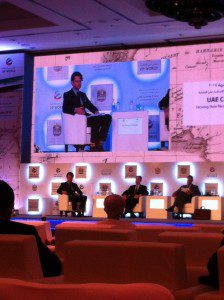 Following up on the CGPCS meeting the UAE held its 4th counter-piracy conference back to back. The conference was an impressive high level meeting seeing the attendance of a range of ministers ambassadors and CEO’s. The programme of the conference is available here.
Following up on the CGPCS meeting the UAE held its 4th counter-piracy conference back to back. The conference was an impressive high level meeting seeing the attendance of a range of ministers ambassadors and CEO’s. The programme of the conference is available here.
In the conference I had the pleasure to moderate the plenary session on lessons learned and the future of counter-piracy. Participants in the panel included His Excellency Joel Morgan, Minister for Home Affairs and Transport, Seychelles, Laurent Bukera the Country Director of the Somalia Office of the World Food Programme, Dr. Grahaeme Henderson, the Vice President for Shipping and Maritime of Shell Trading and Shipping, Pottengal Mukundan the Director of the International Maritime Bureau, Alamdar S. Hamdani the Deputy Chief of the Counter terrorism Section, US Department of Justice and Ron Widdows the Chairman of the World Shipping Council. The debate clearly showed the importance of strengthening regional resolution to maritime insecurity, the importance of industry leadership in developing infrastructure in Somalia and establishing reporting mechanism and the vitality of addressing the culture of impunity by chasing piracy king pins.
Author Archives: admin
Meeting with Somalia’s Minister of Foreign Affairs
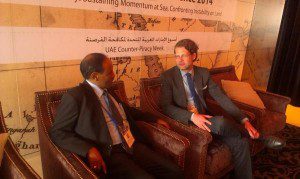 In the frame of the UAE counter-piracy conference I had the opportunity to discuss with Somalia’s Minister of Foreign Affairs and International Cooperation.
In the frame of the UAE counter-piracy conference I had the opportunity to discuss with Somalia’s Minister of Foreign Affairs and International Cooperation.
Day 3 of CGPCS Counter-Piracy week
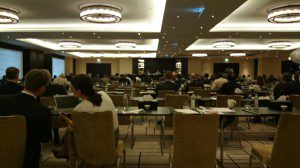 The third day of the CGPCS counter-piracy week saw the first meeting of the new working group on coordination at sea, and the 17th plenary was held. The working group meeting co-chaired by the United Arab Emirates, the Seychelles and Japan focussed on improvements in Maritime Domain Awareness and the current situation at sea. Russia and India gave updates on their counter-piracy operations. The following plenary kicked off with updates from the Federal Government of Somalia, SHADE and EUCAP Nestor. It continued with presentations from the Trust Fund, and the Norwegian Ship Owners Association.
The third day of the CGPCS counter-piracy week saw the first meeting of the new working group on coordination at sea, and the 17th plenary was held. The working group meeting co-chaired by the United Arab Emirates, the Seychelles and Japan focussed on improvements in Maritime Domain Awareness and the current situation at sea. Russia and India gave updates on their counter-piracy operations. The following plenary kicked off with updates from the Federal Government of Somalia, SHADE and EUCAP Nestor. It continued with presentations from the Trust Fund, and the Norwegian Ship Owners Association.
In the meeting I had the opportunity to address the plenary and provide the CGPCS participants with an update on the Lessons Learned Project. I outlined the core functions of the CGPCS and what they imply for the future of the CGPCS and its replicability in other areas of global governance. The transcript of my presentation is available here.
The day continued with two readings of the communique, statements of delegations, the announcement of a new trust fund for the survivors of piracy and their family and the final adoption of the communique.
Day 2 of CGPCS Counter-Piracy Week: The Agenda
 On the first official day of the CGPCS meeting in the JW Marriot Marquis Hotel in Dubai two working group meetings are held and the Legal Forum meets. It is the first time that the working groups meet in a new configuration following up the decision of the 16th plenary to re-organize the structure of the CGPCS. The day starts with a meeting of the working group on capacity building, co-chaired by the United Kingdom and the Indian Ocean Commission (IOC). On the agenda is the progress made by Somalia in Maritime Security Sector Reform, how to improve coordination and institutional questions, such as how the working group should function. The second session is the meeting of the working group titled “Disrupting Pirate Networks Ashore” – a group which is the continuation of Working Group 5. The agenda concerns how to further improve international coordination among criminal investigators and prosecutors in order to arrest core piracy king pins. The day continues with the inaugural meeting of the Legal Forum which is the continuation of the work of the old Working Group 2 in the form of an ad hoc forum, rather than a full-fledged working group. The day ends with a meeting on the communique.
On the first official day of the CGPCS meeting in the JW Marriot Marquis Hotel in Dubai two working group meetings are held and the Legal Forum meets. It is the first time that the working groups meet in a new configuration following up the decision of the 16th plenary to re-organize the structure of the CGPCS. The day starts with a meeting of the working group on capacity building, co-chaired by the United Kingdom and the Indian Ocean Commission (IOC). On the agenda is the progress made by Somalia in Maritime Security Sector Reform, how to improve coordination and institutional questions, such as how the working group should function. The second session is the meeting of the working group titled “Disrupting Pirate Networks Ashore” – a group which is the continuation of Working Group 5. The agenda concerns how to further improve international coordination among criminal investigators and prosecutors in order to arrest core piracy king pins. The day continues with the inaugural meeting of the Legal Forum which is the continuation of the work of the old Working Group 2 in the form of an ad hoc forum, rather than a full-fledged working group. The day ends with a meeting on the communique.
I am participating in the CGPCS counter-piracy week in my capacity as a representative of the Lessons Learned Consortium of the CGPCS and attend the meeting to record (and understand) how the CGPCS works and what lessons can be drawn from it.
Day 1 of Counter-Piracy week in Dubai
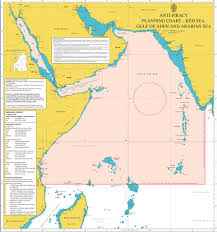 While the meeting of the Contact Group on Piracy off the Coast of Somalia (CGPCS) formally starts on Monday, the 26th, with the CGPCS Working groups holding their meetings, the week long meeting starts with an informal consultation on the High Risk Area. In the last plenary meeting in New York the CGPCS decided to hold a meeting on this issue prior to the following plenary. The discussion concerns which area in the Western Indian Ocean should be considered at high piracy risk. The current High Risk Area covers large parts of the Western Indian Ocean and originally referred to the operational terrain of piracy activity launched from Somalia (see graph). With the decline of the number of incidents the extend of this area is contentious.
While the meeting of the Contact Group on Piracy off the Coast of Somalia (CGPCS) formally starts on Monday, the 26th, with the CGPCS Working groups holding their meetings, the week long meeting starts with an informal consultation on the High Risk Area. In the last plenary meeting in New York the CGPCS decided to hold a meeting on this issue prior to the following plenary. The discussion concerns which area in the Western Indian Ocean should be considered at high piracy risk. The current High Risk Area covers large parts of the Western Indian Ocean and originally referred to the operational terrain of piracy activity launched from Somalia (see graph). With the decline of the number of incidents the extend of this area is contentious.
The High Risk Area (HRA) is primarily a military planing device and used to coordinate patrols, convoys, surveillance and interception by the navies operating in the area. The HRA is however also the area to which the Best Management Practice apply and hence the area in which shipping companies report their positions to the international navies. It is moreover linked to the War Risk Zone established by insurance companies as well as to the hazard pay for seafarers working in the area. In other words the extend of the area has significant economic effects on the costs of shipping.
Whether the area should be narrowed down given the drop of piracy activity is a contested issue in which those concerned about the costs of the HRA stand against those that fear the effects that narrowing down the area will have on the potential return of piracy (e.g. less compliance with BMP, less surveillance).
ESDC course on piracy in Rome
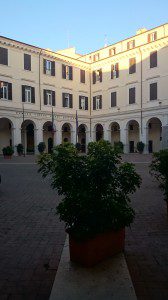 The European Security and Defense College (ESDC) held a course on contemporary piracy in Rome. The program was attended by over 30 professionals, many of which senior, from across Europe, and covered the full spectrum of the challenges of contemporary piracy, ranging from deterrence, surveillance and interruption at sea, prosecution and transfer of suspects to capacity-building and the role of private security companies.
The European Security and Defense College (ESDC) held a course on contemporary piracy in Rome. The program was attended by over 30 professionals, many of which senior, from across Europe, and covered the full spectrum of the challenges of contemporary piracy, ranging from deterrence, surveillance and interruption at sea, prosecution and transfer of suspects to capacity-building and the role of private security companies.
I participated in the two final days of the week long program and gave a lecture on capacity building based on my article forthcoming in Global Affairs and on the Lessons Learned Paper I recently wrote on the issue. I especially stressed the importance for recognizing that capacity building is a contested term, that it has political effects and discussed the intricacies of ownership.
Counter-Piracy Week of CGPCS in Dubai
The 17th plenary of the Contact Group on Piracy off the Coast of Somalia (CGPCS) and its working group meetings will take place in Dubai from the 26th to the 28th of October. At the plenary I will give a short talk that provides an overview over the key results of the Lessons Learned Project on the group. The future of the CGPCS and the current counter-piracy architecture will be a key issue on the agenda, as will be questions such as how to improve capacity building coordination, how to re-shape the High Risk Area and to ensure high alert of the shipping community. The meeting will be followed by the high level conference “Securing State Recovery: Sustaining Momentum at Sea, Confronting Instability on Land” during which I will be moderating the plenary panel on “Lessons Learned from Maritime Piracy in the Horn of
Africa and a Framework for Future Cooperation”.
Book on International Practice Theory published
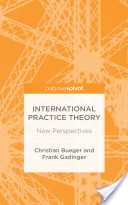 The book International Practice Theory: New Perspectives has now been published. It is co-authored with Frank Gadinger. Together we discuss what practice theory is, how it fits into international relations theory and explore core approaches and challenges with a particular emphasis on methodology. Here’s the official blurb
The book International Practice Theory: New Perspectives has now been published. It is co-authored with Frank Gadinger. Together we discuss what practice theory is, how it fits into international relations theory and explore core approaches and challenges with a particular emphasis on methodology. Here’s the official blurb
International Practice Theory has become one of the core perspectives in International Relations. Since the practice turn, there has been significant interest in developing new theories and methodologies for understanding world politics and global governance. This unique study reviews these new approaches, offering a focused discussion of the strategies, techniques and issues. Examining how International Practice Theory is linked to social theory and international relations theory, Bueger and Gadinger explore Bourdieu’s praxeology, the community of practice approach, narrative approaches, Actor-Network Theory and Boltanski’s pragmatic sociology to address core questions of transformation, scale, normativity and materiality. Advocating greater attention to translating International Practice Theory into empirical research, this book will be a valuable resource for all those interested in social theory, practice theory and the international.
A preview of the book is available here.
Research Seminar: “Bursts! Theoretical Fashions in the Study of International Relations” in Copenhagen
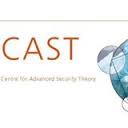 On Wednesday, 8/10/2014 we will discuss the paper titled “Bursts! Theoretical Fashions in the Study of International Relations – A Bibliometric Analysis” at a Research Seminar of the Center for Advanced Security Theory (CAST) which I coauthored with Felix Bethke (Universität Duisburg-Essen).
On Wednesday, 8/10/2014 we will discuss the paper titled “Bursts! Theoretical Fashions in the Study of International Relations – A Bibliometric Analysis” at a Research Seminar of the Center for Advanced Security Theory (CAST) which I coauthored with Felix Bethke (Universität Duisburg-Essen).
In the seminar we aim at discussion the following: What are the drivers of scientific progress and intellectual innovation? Usually we peer to the philosophy of science and seek some sort of rational and logical answer to this question and argue that somehow we move closer to the truth. But scientists are humans, too. And perhaps even very social ones. Relying on an understanding of science as a social practice, we argue in this paper that scientists love fashion. We take International Relations as an example and show that the progress and evolution of this discipline can be read as a sequence of fashions. We draw on the results of a burst detection analysis. Understanding researchers as fashionistas, not only challenges some conventional wisdom about how science works, but raises a set of questions, such as, whether we are working in more fast-paced and complex disciplinary environments.
For registration- or more information about CAST Research Seminars, go to events. Contact me by email to receive a copy of the draft paper.
Workshop on Maritime Security Studies in Copenhagen
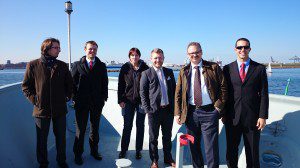 From the 23rd to the 24th of September we met in Copenhagen to discuss the contours of maritime security studies, different theoretical perspectives on the maritime dimension of security as well as a range of regional arenas. The workshop was a first step to a book manuscript that reviews the challenges of maritime security and how academia can contribute to addressing them. The workshop was hosted by the Centre of Military Studies, Copenhagen University and featured a visit to the Danish Naval Academy and a tour on a Diana class patrol vessel. Participants in the project include Jeremy Black (Exeter), Douglas Guilfoyle (UCL), Carolin Liss (PRIF), Christian Wirth (Griffith), Francois Vrey (Stellenbosch), Thomas Horn Rasmussen, Stale Ulriksen, Basil Germond (Lancaster), Aaron Casavant, Geoffrey Till (King’s), Johannes Kidmose and Lars Bangert Struwe.
From the 23rd to the 24th of September we met in Copenhagen to discuss the contours of maritime security studies, different theoretical perspectives on the maritime dimension of security as well as a range of regional arenas. The workshop was a first step to a book manuscript that reviews the challenges of maritime security and how academia can contribute to addressing them. The workshop was hosted by the Centre of Military Studies, Copenhagen University and featured a visit to the Danish Naval Academy and a tour on a Diana class patrol vessel. Participants in the project include Jeremy Black (Exeter), Douglas Guilfoyle (UCL), Carolin Liss (PRIF), Christian Wirth (Griffith), Francois Vrey (Stellenbosch), Thomas Horn Rasmussen, Stale Ulriksen, Basil Germond (Lancaster), Aaron Casavant, Geoffrey Till (King’s), Johannes Kidmose and Lars Bangert Struwe.
At the workshop I presented my paper titled “What is Maritime Security”. In the paper I argue to understand maritime security as a “buzzword”. This implies that to some degree everyone can agree on the importance of maritime security, but on the other side, the concept also hides controversies. Arguing that striving for a universal definition of maritime security is a useless project, I outline three different theoretical strategies to grasp the meaning of maritime security. The first is based on semiotics and explores the relations of maritime security to other concepts such as seapower, marine safety, blue economy or resilience. The second is based on the securitization framework and studies how different issues are made part of the maritime security agenda. The third is based on practice theory and asks what actors do in the name of maritime security. Please contact me to receive a copy of the draft.